During the April 6 virtual town hall for the steering committee of the Computing, Data Science and Applied Science Initiative, secretary of Data and Analytics for Student Assembly and Omnibus Project Director John Willis ’23 presented findings from the Omnibus Survey. The survey recorded student comments on the creation of a new “academic unit” for computer science, data science and applied science.
The Student Assembly Department of Data and Analytics conducted the survey between March 3 and April 2. The Flat Hat received a copy of the report that the Department of Data and Analytics gave to the steering committee, as well as the survey data.
A total of 1446 undergraduate and graduate students responded to the survey. The class of 2026 had the highest number of responses.
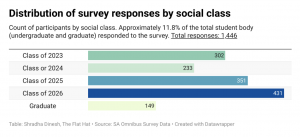
The report summarizes data from the Omnibus Survey that pertains to students’ perspectives and knowledge of Vision 2026 and the academic steering committee. Vision 2026 is the College’s strategic plan spanning 2021-2026, with three central goals: to expand the College’s reach, educate for impact and evolve to excel.
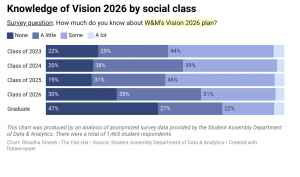
The findings of the report, combined with analysis from The Flat Hat, show that overall student knowledge of Vision 2026 and the steering committee is low, but most students report being at least somewhat receptive to the idea that data and statistical analysis are “core” to their liberal arts education at the College.
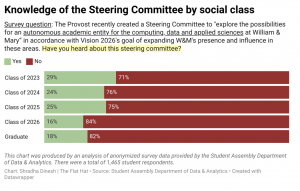
“The survey says that students are in support of the values of the committee, but they just don’t necessarily have a full grasp and they have some questions about how it will affect other aspects of campus, especially how it will affect tuition and how it will affect other class offerings and data science class offerings,” Willis said in his presentation to the committee.
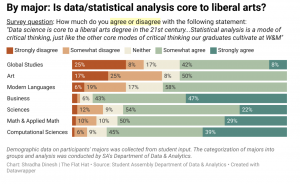
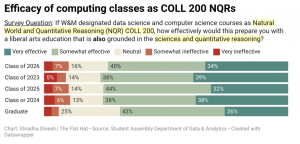
The report also highlights the 10 most prominent student questions for the steering committee. Students submitted their top three questions for the steering committee in the Omnibus Survey, and the Department of Data and Analytics utilized machine learning and natural language processing methods to distill their responses.
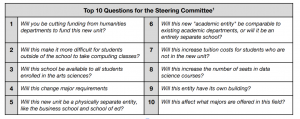
Committee co-chair and Dean of the faculty of Arts and Sciences Suzanne Raitt addressed the above questions in an email to The Flat Hat.
According to Raitt, the creation of an academic unit for computer, data and applied sciences will not make it more difficult for students outside of the school to take computing classes. She noted that the school will be available to all students enrolled in Arts and Sciences. The plan is also not slated to impact current major requirements or what majors the College offers.
“Academic unit” is a broad term that encompasses potential administrative structures for the proposed computing, data science and applied science program. The goal of the committee is to evaluate different administrative structures such as departments, programs, schools, or other designations for the new unit. A unit’s status affects faculty hiring, status and finances.
“We do not want to block students from entering these programs,” Anthony Stefandis, professor of computer science and director of data science, said. “We’ll do our best to make sure that we cater to all the needs of our student communities.”
Further, the physical location of the data science, applied science and computer science departments will be in ISC IV once the new facility is open.
“So, in that sense, yes, those units will be in a separate building,” Raitt said. “This doesn’t mean much about the administrative structure, though. Government and Economics share a building, for example, but that doesn’t make them a separate school.”
In addressing the administrative status of the new “academic entity,” Raitt said the committee is yet to determine whether the entity would promote the units to department status or create a separate school. Raitt said there is no plan to merge the three departments into one department.
According to Raitt, the committee has not yet determined the funding levels for the new unit, but assured students that the College does not plan on cutting funding from other departments.
“We value all the disciplines we offer in A and S and are eager to support all of them in every way possible,” Raitt said.
Raitt referred to the Commonwealth of Virginia’s “Tech Talent Investment Program” in her email as a source of funding for the initiative. The goal of the initiative is to increase the number of graduates in “computer science and closely related fields,” according to the TTIP. The initiative is a $2 billion dollar investment by the state, donors and corporate partners.
During an Arts and Sciences faculty meeting in April 2021, a motion to elevate the data science program to department status failed in a Zoom poll. 146 faculty members voted, with 38% of those responding voting in favor, 45% against and 17% abstaining. The proposal behind the motion notes the limits of program status:
“Programs at William & Mary are critically limited in four ways: (1) they are typically not provided with any annual operational funding; (2) they typically do not have dedicated administrative support; (3) they rely on joint faculty appointments; and (4) they cannot award tenure, or house tenure-eligible positions,” the proposal reads.
The proposal for the Department of Data Science from 2021 references the TTIP as a source of funding.
“The Commonwealth of Virginia has established ‘Tech Talent’ and ‘High-Demand Degree’ initiatives,” the proposal states. “As a result, the proposed department will be financially independent, does not burden our standard A&S operating budget, and is funded by money specifically ear-marked for Data Science in the context of tech talent.”
Funding from TTIP is available through 2038, but it is unclear how budgeting could change over the next 15 years.
“Dean Donoghue Velleca indicated that the funds provided by the Commonwealth were not for short-term use but were base budget additions that would continue for the next twenty years,” the minutes of the 2021 meeting state.
During the April town hall, Willis told the committee that students’ top question about the initiative regarded the allocation of funds for the new unit to meet student and departmental demand. Committee member and Sidney P. Chockley professor of computer science Evgenia Smirni echoed Raitt’s emphasis on state funding.
“There are funds that exist within the state of Virginia that provide for high demands of degrees, and also for degrees in computer science,” Smirni said. “We have been fortunate enough to receive a significant amount of money just for the growth of specific areas. With this initiative, we would like to be able to take advantage of things like that that the state of Virginia makes available to all of its universities.”
Raitt also noted the increase in student and industry demand for computing studies.
“Student demand for CSCI courses is high, presumably both for academic interest and because they feel a CSCI degree will position them well in the job market,” Raitt said. “Faculty are eager to increase their external grant funding, work with graduate students and pursue excellent research.”
The process of developing a new academic unit began in spring 2022 when Provost Peggy Agouris named an ad hoc design team to consider plans for a new academic school or unit for data science, computer science and applied science. In December 2022, the chairs of computer science and applied science, and the director of data science presented a draft proposal outlining a new computing school.
Agouris dissolved the design team in October 2022, and in 2023, formally named a steering committee composed of faculty members across departments in Arts and Sciences to fine-tune the details of the new “academic unit” after receiving feedback from students, faculty and stakeholders.
According to its webpage, the committee’s goal is to produce a report that outlines different models for the new unit, their respective financial and operational details and considerations for undergraduate and graduate education.
The committee’s report will not specifically recommend a model or structure for the new unit. This report is due on May 31 and will be shared with the College community.

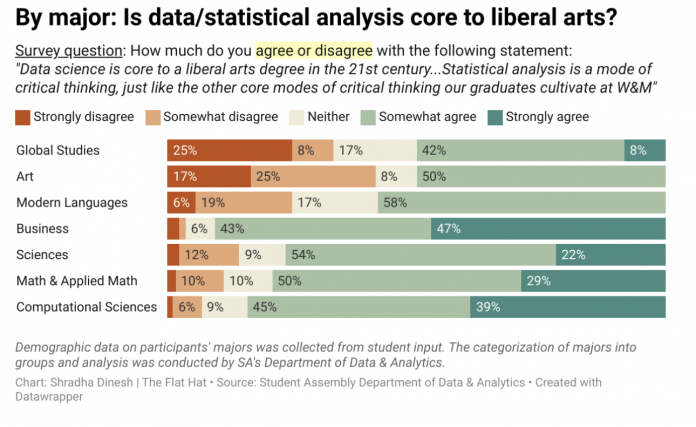
so cool great story!!
Interesting that those who know best — because they actually study the liberal arts — are most likely to say no.